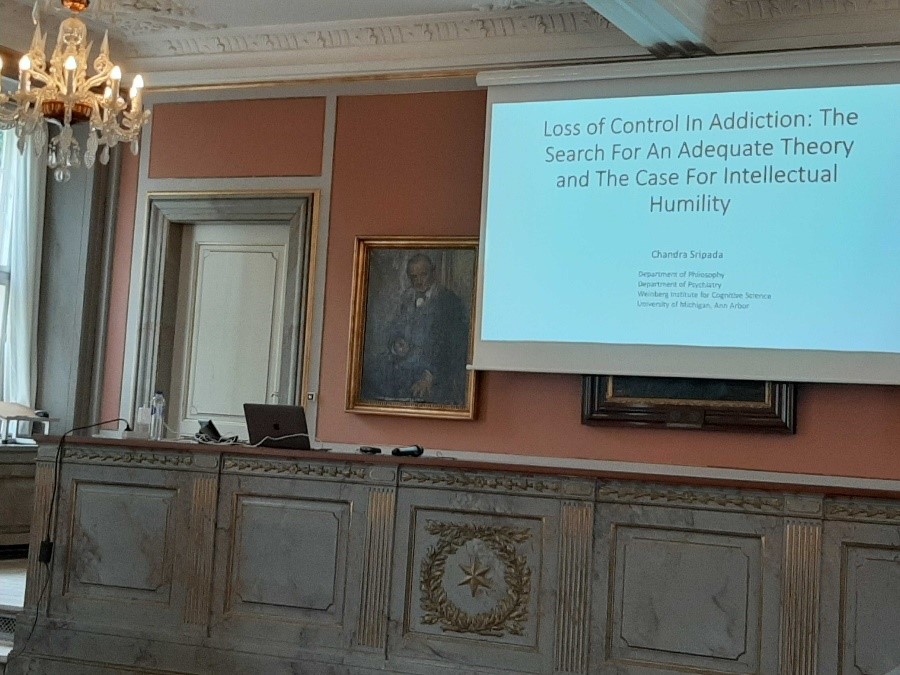One of our PhD researchers, Emma Moormann, just attended a workshop called ‘Models of Control and Moral Responsibility’. The workshop took place in a beautiful venue of the University of Copenhagen and was organized by the Cognition, Intention and Action (CoInAct) research group. The interdisciplinary character of the workshop made it a perfect fit for our project: contributions did not only come from philosophers, but also from cognitive psychologists, psychiatrists and neuroscientists.
As the conference organizers state, ‘Intuitively, a person is morally responsible for her actions only if she exercises the right kind of control in the performance’. But when we start thinking about what it might mean to fulfil this control condition, matters become much more complicated.
The aim of the workshop was to engage in a discussion about an empirically consistent and theoretically coherent notion of control and its relation to moral responsibility.
The empirical component was represented in various talks on neuroscience and cognitive psychology (but it should be noted that findings in experimental philosophy were also frequently exchanged).

Bernard Hommel, for example, started the first day by explaining how dual-pathway models of action are based on a few false premises, such as the misconception that there needs to be a competition between automatic and goal-sensitive actions. He proposed a different model according to which all actions are goal-directed and he finished by claiming that this makes everyone fully responsible for all actions in a causal sense.
Agnes Moors also formulated some critiques of the dual process models in psychology, but did so in a different way. She proposed a parallel-competitive version of a dual process model that is rooted is the assumption that goal-directed processes can also be very automatic. Moors claimed that her version of the dual process model gives us more effective possibilities for improving our goal-directed behavior.
A talk packed with empirical evidence and interesting experimental findings was that of Felipe De Brigard and Kristina Krasich. They explored the connections between counterfactual thinking, prospective memory and control. They explained how counterfactual thinking is an important component of anxiety and depression, both as a symptom and a topic in behavioral therapy. Moreover, people with anxiety tend to give much higher estimations of their perceived level of control over past events than persons without such a disorder.
The second day was opened by Marcel Brass, who talked about Libet-style experiments. He cited various empirical results to support his claim that neuroscience does not actually challenge our intuition of conscious free will to the extent that, looking at the claims of Libel et al., one might believe it does. Brass challenged some implicit assumptions in the Libet-style experiments and proposed an alternative, refreshing interpretation of the Libet results.

One of the talks that would fall more on the theoretical side of the (admittedly rather artificial) empirical-theoretical distinction, was that of Thor Grünbaum and Soren Kyllingsbaek. They distinguished a few components of successfully retrieving a previously formed intention and showed how these components can be cleverly mapped on various important current debates on moral responsibility and control.
Chandra Sripada discussed the much-debated question whether addiction involves loss over control over use of drugs. Or more precisely, he quickly convinced us that this question is currently impossible to answer, because we do not have detailed models of what loss of control is in the first place. After discussing the incompleteness of various theories, he made a convincing case for intellectual humility in this domain.
Annemarie Kalis connected her talk to the theme of the workshop by talking about self-control. Inspired by Aristotle’s thinking on self-control, she understands the resistance of temptation as the outcome of a struggle, an outcome that can be achieved in various ways. She then introduced the outline of her exciting new project on psychological skills that enable you to intervene in the process by which you generate options for acting.
After many talks that were more empirical in nature, the conference ended with two highly theoretical philosophical talks. First, Timothy Schroeder made the bold claim that responsibility can be equated with acting for reasons. This implies that (self-)control is not a necessary condition for moral responsibility: it is perfectly possible to say that someone is responsible for an action in this sense even if her self-control fails. Notably, Schroeder discussed actions of people with Tourette’s Syndrom to support his case – something that Chandra Sripada also did in an interesting way.
Alfred Mele concluded with a thorough metaphysical survey of the relation between direct control, direct moral responsibility and direct freedom. He explained how competing views (traditional compatibilism, libertarianism and semicompatibilism, to name a few) differ in their understanding and acceptance of the principle of alternative possibilities. Mele’s talk and the subsequent discussion beautifully allowed the workshop attendants to begin to synthesize the ideas put forward during the two days.
The workshop has definitely succeeded in facilitating a fruitful exchange between different disciplines: many participants, if not all, have probably gone home with exciting new ideas to develop. That definitely holds true for Emma. The subject of the workshop was relevant for Emma’s research, as she is thinking about various kinds of moral responsibility in the context of (neuro)epigenetics. Because she will be focusing mostly on collective responsibility, whereas the perspective of the workshop was quite individualistic, she will need to spend some time thinking about the implications of the talks for her own work. Nonetheless, she learned a great deal from the talks and was very inspired by the open-minded research approach of the participants.
